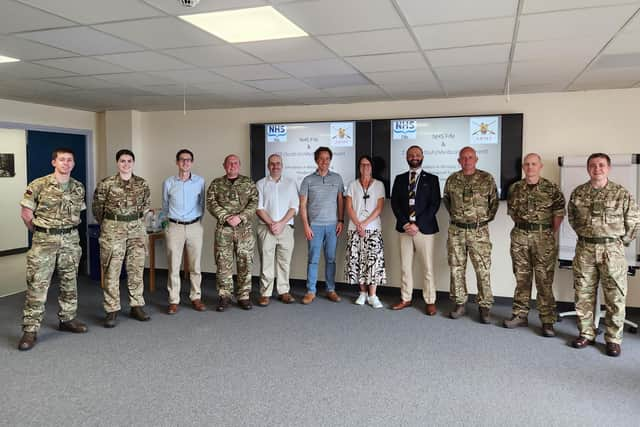State of art Fife centre to help medical training for army personnel in new deal
and live on Freeview channel 276
The £200,000 simulation centre at Queen Margaret Hospital in Dunfermline is at the centre of a new arrangement between NHS Fife and the Glenrothes-based 152 Medical Squadron of the British Army - part of the 225 (Scottish) Medical Regiment – which is now able to make full use of the facility to further enhance their medical training and development.
The centre opened last year and enables clinical staff to further develop their skills and practice real-time scenarios in a controlled environment.
Advertisement
Hide AdAdvertisement
Hide AdFunded by the Fife Health Charity at a cost of more than £200,000, it hosts its own four-bedded ward area and utilises cutting edge technologies to help recreate realistic medical scenarios. It uses the latest highly realistic patient mannequins, which can mimic a large range of medical conditions.


Major Babar Akbar, who combines his role in the British Army with another as tutor in simulation at the centre, was instrumental in establishing the new partnership.
He Akbar said: “By extending use of the training centre to 152 Medical Squadron our medics are being given a unique opportunity to enhance their skills in high pressure scenario – but in a controlled and realistic environment. This opportunity is invaluable as it allows medics to prepare for crisis situations before having to encounter them in real life – ultimately increasing the chances of a better outcome for those who require their care.”
The British Army provided wide-ranging support during the early stages of the pandemic, most notably supporting the board’s procurement and transport teams in developing supply routes to get vital PPE into the hands of frontline health and social care staff.
Advertisement
Hide AdAdvertisement
Hide AdTeams from the Royal Army Medical Corps also supported the subsequent vaccination programme, vaccinating patients in clinics both in Kirkcaldy and Dunfermline as part of a planned expansion during the initial phase of the campaign.
Dr Chris McKenna, NHS Fife medical director, said: “It is a privilege to extend the use of our ground-breaking training centre to 152 Medical Squadron and I look forward to a continued close relationship with our armed forces going forward.”